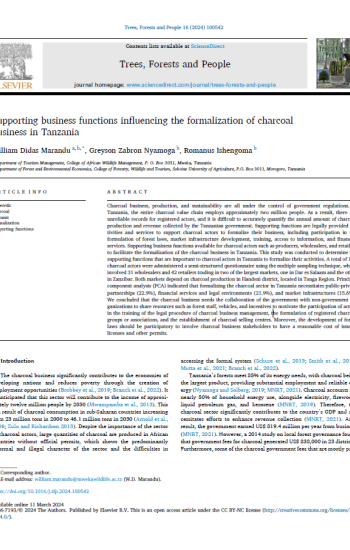
Supporting business functions influencing the formalization of charcoal business in Tanzania
Charcoal business, production, and sustainability are all under the control of government regulations. In Tanzania, the entire charcoal value chain employs approximately two million people. As a result, there are unreliable records for registered actors, and it is difficult to accurately quantify the annual amount of charcoal production and revenue collected by the Tanzanian government. Supporting functions are legally provided activities and services to support charcoal actors to formalize their business, including participation in the formulation of forest laws, market infrastructure development, training, access to information, and financial services. Supporting business functions available for charcoal actors such as producers, wholesalers, and retailers to facilitate the formalization of the charcoal business in Tanzania.
This study was conducted to determine the supporting functions that are important to charcoal actors in Tanzania to formalize their activities. A total of 107 charcoal actors were administered a semi-structured questionnaire using the multiple sampling technique, which involved 31 wholesalers and 42 retailers trading in two of the largest markets, one in Dar es Salaam and the other in Zanzibar. Both markets depend on charcoal production in Handeni district, located in Tanga Region. Principal component analysis (PCA) indicated that formalizing the charcoal sector in Tanzania necessitates public-private partnerships (22.9%), financial services and legal environments (21.9%), and market infrastructures (15.6%). We concluded that the charcoal business needs the collaboration of the government with non-government organizations to share resources such as forest staff, vehicles, and incentives to motivate the participation of actors in the training of the legal procedure of charcoal business management, the formulation of registered charcoal groups or associations, and the establishment of charcoal selling centres. Moreover, the development of forest laws should be participatory to involve charcoal business stakeholders to have a reasonable cost of issuing licenses and other permits.
William Didas Marandu, Greyson Zabron Nyamoga, Romanus Ishengoma, Supporting business functions influencing the formalization of charcoal business in Tanzania, Trees, Forests and People, Volume 16, 2024,100542, ISSN 2666-7193, https://doi.org/10.1016/j.tfp.2024.100542. (https://www.sciencedirect.com/science/article/pii/S2666719324000499)
-

Mr William Marandu
Research Associate -
Greyson Zabron Nyamoga
-
Romanus Ishengoma
We support the free flow of information. Please share:
More content
-

What Foot and Mouth Disease-free means for South Africa’s game meat trade
Ms Lydia Daring Bhebe…Explore the latest developments in South African provinces achieving and maintaining Foot and Mouth Disease (FMD) free status…
Articles -

The world wildlife trade regulator is 50 – here’s what has worked and what needs to change
Daniel Challender…Most countries implement Cites, the Convention on International Trade in Endangered Species of Wild Fauna and Flora as…Articles -

Enabling Sustainable Wildlife Trade
Prof Francis VorhiesEnabling sustainable wildlife trade is a key policy measure for growing Africa's wildlife economy. In this respect, CITES…
Articles -

Has CITES become too complicated to be effective?
Prof Francis VorhiesGovernments agreed to the text of CITES in the 1970s, which is quite straightforward. However, the agreement’s implementation…
Articles -

From poachers to providers: Can Africa's wild meat market save wildlife?
Dr Wiseman NdlovuHave you ever considered how wild meat could be more than just a cultural staple but also a…
Articles -

As a fellow of the African Wildlife Economy Institute (AWEI), I am excited to attend the upcoming 3rd…
Articles -

A theory of change to improve conservation outcomes through CITES
Dr Michael 't Sas-Rolfes…Here we articulate the implied theory of change (ToC) underpinning the design and operation of CITES (Convention on...
2025Research -

Wild Meat Value Chain Integration Systems: Opportunities for Value Chain Formalisation and Scaling in Africa
Dr Wiseman Ndlovu…Establishing a legal, safe and sustainable wild meat sector promises to potentially reduce demand for illegally sourced meat...
2025Research -

AWEI's 2024 Wildlife Economy Dialogue Series
Ms Emily TaylorRediscover 2024: A year of insight and inspiration
In 2024, AWEI proudly hosted three ground-breaking dialogue series in…
Articles
Get updates by email
Through impactful research, stakeholder engagement, and professional development, AWEI is supporting the wildlife economy across Africa. Please subscribe for occasional updates on our work and forthcoming events.
Sign up for a quarterly dose of AWEI insights
In a complex and changing world, AWEI generates strategic ideas, conducts independent analysis on wildlife economies, and collaborates with global scholar-practitioners to provide training and expertise for biodiversity conservation, climate resilience, and inclusive economic opportunities in Africa.
